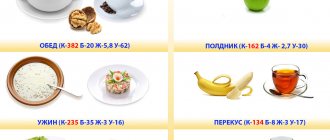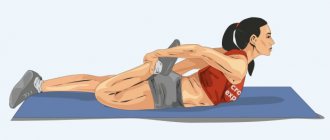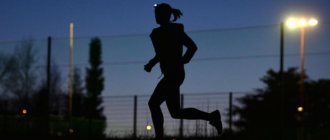There is a well-known saying: you are what you eat. In the running theme, you can say: you run the way you eat. What, how much and when you eat directly affects the effectiveness of your workouts. We asked professional running coaches what to eat before running. And, as always, everyone has their own opinion on this matter.
Complex carbohydrates 2-3 hours before training
Ilya Belousov, head coach of the Run Or Die running club:
Your pre-workout meal should consist of carbohydrates. Carbohydrates are the so-called “fuel” that supplies our body with energy during the training process. I recommend eating low fiber carbohydrates before running. For example, various cereals cooked in water, skim milk or yogurt, energy bars, breakfast cereals and fruits, pasta. Some people prefer to eat baked goods, but those who are watching their figure should avoid such foods.
The meal before running should not contain any fatty foods, since they are poorly absorbed by the body and take a long time to digest; running after such a meal becomes difficult and uncomfortable. Dietary fiber contained in legumes can cause cramps and flatulence, so it is better to avoid them too.
I don't recommend training on an empty stomach. Such training will not give the desired result; you may feel unwell, dizzy or lose consciousness. At the same time, you should not eat too heavily before training, as this can lead to heaviness in the stomach, pain in the side, nausea while running, as well as a decrease in the endurance and speed qualities of the athlete.
I recommend that my students eat a large meal (complex carbohydrates) 2-3 hours before training, or have a light snack (smoothie, fruit, dried fruit) 30 minutes - 1 hour before training. However, it is worth noting that the intensity of food digestion is different for everyone, so the optimal time to eat before training can be determined independently in practice.
As for fluids, I do not recommend using too much water before starting a workout. A large amount of drinking water results in a huge load on the vascular system, heart and kidneys. This is one of the reasons why a runner may feel a tingling sensation in their side while running a race. Half an hour before training, you can drink no more than 200 ml of water. Don’t forget to drink water in small sips during the training process.
How much water should runners drink?
What's the best way to have breakfast in the morning before running?
Carbohydrates are absorbed faster by the body, so they must be included in the morning diet.
Carbohydrate-rich foods include:
- porridge with water;
- low-fat dairy products;
- energy bars;
- fruits;
- breakfast cereals;
- bakery products;
- additional sports nutrition.
Disagreements regarding the intake of proteins have not yet led to a clear decision. There is a golden mean: do not eat cheese and sausages, but enjoy boiled chicken breast or hard-boiled eggs.
Fruits
The ideal fruit for a pre-run snack is a banana.
It contains almost 100 calories and includes:
- vitamins: K, choline, E, C, A, B;
- microelements: potassium, phosphorus, zinc, iron;
- carbohydrates: fructose, sucrose, glucose;
- fatty acid;
- amino acids;
- and many other beneficial substances and minerals.
It is better to exclude apples and pears from a pre-run snack, as they contain a large amount of fiber.
Oatmeal, buckwheat
Buckwheat is a source of microelements and therefore deservedly has the title of the most nutritious. It contains B vitamins and iron, which are necessary for training, as they are involved in the process of delivering oxygen to the muscles. Thanks to buckwheat porridge on water, running will be effective and easy.
You can prepare the porridge with vegetables, for example, tomatoes, radishes or carrots, and also drink tea or smoothies with it.
Oatmeal is a popular and nutritious breakfast all over the world. Biotin content is 40% of the daily value in 100 g of porridge. A lack of this vitamin is accompanied by fatigue, lethargy and pain in the muscles, which should not be allowed for athletes.
Avoid buying instant oatmeal as it contains high amounts of sugar.
Whole grain pancakes with honey
It takes more time to prepare pancakes, but they will help give the necessary tone to the body and, accordingly, an effective run.
The recipe for whole grain pancakes is as follows:
Ingredients:
- apple juice, preferably freshly squeezed – 200 ml;
- eggs – 2 pcs.;
- flour – 200 g;
- baking powder – 1 teaspoon;
- vanilla optional.
Mix all the ingredients and get pancake dough. Bake each side until cooked through and then serve, first brush with honey. A delicious and healthy breakfast is ready!
Rice cakes with berries
A great option for a morning snack before running is rice cakes. Berries are chosen to suit every taste: sea buckthorn, raspberry, cherry or strawberry. Rice cakes together with berries are filled with a large amount of carbohydrates and other essential microelements for athletes and morning joggers.
Smoothie with muesli
A smoothie is a drink filled with your favorite and healthy foods. The thick drink is perfect for those who find it difficult to run even with a small snack.
The ingredients may be different, one of the options:
- banana;
- muesli;
- Orange juice;
- yogurt.
All foods must be warm. Mix in a blender and enjoy the taste while looking forward to an effective workout.
Energy bars
The bars fill you up well and give you the energy you need for running.
When choosing, the following food additives must be excluded:
- maltose;
- sucrose;
- syrup;
- corn syrup.
The best thing is a homemade energy bar made from oatmeal, honey, nuts, dried fruits and butter.
Depends on training time
Sergey Sorokin, co-founder and head coach of the Jaxtor marathon club:
Training plans for marathon and half marathon. and start preparing today.
It all depends on personal preference and the timing of the workout. If you workout in the morning, it is better to eat porridge or toast so that you do not feel discomfort from hunger. If you train in the evening, then 2-3 hours before you can eat slow carbohydrates (rice, buckwheat, pasta, porridge) with light meat such as fish, chicken or eggs. It is better not to eat red meat before training, because... This food takes a long time and is difficult to digest.
In general, everything is individual, so find your own way and use it. The main thing is not to eat fatty, salty, spicy foods before running, and then your body will thank you with good condition during training.
In the morning, I eat a little porridge (4-5 tablespoons) an hour before training, and pasta and 2 eggs 2-3 hours before my evening training.
Long runs
With longer distances things are a little more complicated. If you have a workout of 75 minutes or more, you can calculate how many carbohydrates you need to have in your fuel tank before you start your run. To do this, you need to multiply your weight by 1.1, and then by the number of hours remaining before training.
For example, your weight is 80 kg. 80 × 1.1 = 88. If there is one hour left before the start, then you need to eat 88 grams of carbohydrates (88 × 1 = 88), and if half an hour - then 44 grams (88 × 0.5 = 44).
What might these carbohydrates look like? Like half a bagel (30g carbs) and 8 ounces of sports drink (15g). Or a small bun (25 g) with two tablespoons of your favorite jam or preserves (30 g). You can take a carbohydrate gel and dilute it with water (25 g of carbohydrates), and then add 120 ml of juice or half a banana to this.
And don't forget to bring water and energy bars or gels to snack on during your run.
The best breakfast is oatmeal with water
Maxim Denisov, founder and head coach of the Gepard school:
Firstly, it is necessary to eat before running. Nowadays there is a fashion, especially among girls, to run on an empty stomach: supposedly this burns more fat. But no, the workout will not be complete on an empty stomach.
If you train in the morning, the best breakfast is oatmeal with water. You can eat a banana or toast with cheese. This food is quickly digested, and you can start training in 30-40 minutes.
If you train in the evening, then watch what you eat for lunch. I do not recommend eating fried or meat. You can have soup, or something fish or chicken for main course. This lunch will be digested in 2-3 hours. But if you had a heavy lunch, the food will not be absorbed faster than four hours, and you may feel heaviness during training.
Short runs
Even if you only need to cover 5-6 km, this does not mean that you can start training as soon as you get out of bed. If you skip breakfast, you will feel completely exhausted in the last kilometer. There are two ways to fix this: eat something very light before the run (and for 5–7 km you don’t need that much) or take an energy bar or gel with you to snack on the run: at the third kilometer, and then at the fifth .
Before your run, Pamela recommends drinking about 8 ounces of an energy drink and eating half an energy bar. For a short distance this should be enough.
Why sports nutrition, and not bread with peanut butter or oatmeal with berries and nuts? Because products for athletes were developed so that the body easily and quickly digests them and almost immediately receives all the necessary elements.
But on the eve of a run, it is advisable to have a hearty dinner.
Slow carbohydrates
Denis Vasiliev, coach of the running club Runlab Running Laboratory, St. Petersburg:
You can eat anything before running. How the body will react to this or that food - that is the question. It is recommended to eat foods rich in slow carbohydrates: legumes, various cereals, whole grain products, vegetables and fruits. Then the body will be supplied with “fuel” for a long time, and your energy reserves should last for a long time. You should be careful with dairy products, some vegetables and fruits, and other foods rich in fiber. Excessive consumption can lead to gastrointestinal upset during training. Ideally, do not drink tea or coffee before training. They contain caffeine, which is a diuretic. And dehydration is a runner's enemy.
The optimal period of time between eating and running is individual for everyone. I know fast runners who can have a hearty breakfast, and an hour later they are already “rushing around” during training and feel quite comfortable. Choose the diet that is optimal for you, monitor your diet and then, undoubtedly, you will be in great shape both in everyday life and in training!
Sprinting
Our definition of a short distance may differ from yours, so we want to immediately indicate that in our understanding, short-distance running is any type of running up to three kilometers.
This could be a sprint, a short test run, or even your first run. Short distance running is likely to be faster than long distance running.
Your main support, especially if you are a competitive sprinter, is protein, as increasing your protein intake is important for maintaining lean muscle mass. Protein is essential for building muscle, and sprinting is an explosive sport that uses many muscle groups, including the legs, arms and abdomen.
Before each run, try to eat protein foods. This could be a protein shake, bean salad, or turkey sandwich. Don't forget to leave enough time between running and eating, because your food needs time to be digested. Believe me, running on a full stomach will cause severe discomfort.
After your run, once you've completed your stretching and cooled down, try to eat a meal that contains plenty of protein. You don't have to rush and eat protein within 20 minutes or an hour after your run. Just make sure your next meal contains plenty of protein.
Simple carbohydrates and be sure to drink
Yana Khmelev, founder and head coach of the Bestia.club running school:
Before running, you can eat simple carbohydrates and be sure to drink. Especially if you train in the morning, because your blood thickens overnight. Simple carbohydrates are something sweet: a banana, water with honey, juice, bread with jam, or even candy. You need something that will immediately enter the bloodstream and be burned during training. It is better to eat about 100-200 kcal, make sure you burn more calories than you consume.
There is no need to eat fiber, because products containing it are difficult and take a long time to digest. Also, you should not eat anything fatty or protein - this also takes a long time to digest.
Light snack before running
A pre-run snack, consumed 30-60 minutes before your run, provides your body with quick fuel.
A light snack is essential if you intend to run for more than 60 minutes, but is also great at lower levels.
It serves the same purpose as a full meal, controlling hunger and ensuring optimal blood sugar levels.
A pre-meal snack consists primarily of carbohydrates and contains far fewer calories than a full meal.
Stick to low-food snacks, as exercising with too much food in your stomach can lead to indigestion, nausea, and vomiting ().
What are the best pre-run snacks to eat:
- Pieces of fruit such as banana or orange.
- Half a sports energy bar.
- Half a bun with honey or jelly.
- 15 crackers, such as saltines or pretzels.
- 25 grams of breakfast cereals.
In addition to your pre-light snack, drink 150-295 ml of water to keep your body well hydrated (, ).
Limit your intake to the same foods you would eat in your pre-run meal, including foods high in fat and fiber.
You may also want to avoid dairy products, especially if you don't know how well you can tolerate them. Dairy products are made from milk and contain the sugar lactose.
In some people, consuming too much lactose can cause bloating, gas, or diarrhea (,).
Foods high in lactose include milk, cheese, butter or cream. Yogurt is also a dairy product, but it is better tolerated because it contains less lactose (, ,).
Conclusion:
A pre-run snack should consist primarily of easily digestible carbohydrates, such as fruit or crackers. If you do not tolerate dairy products well, you should avoid consuming them before running.
No fatty foods
Oleg Babchin, founder and senior coach of the Second Wind school:
Exercise requires energy: we get the best and most effective “fuel” from carbohydrates, both fast and slow. Your stomach should be empty at the start of your workout! Any food with a significant fat content will take a long time to digest, and there is a chance of starting a heavy workout, which will negatively affect breathing. It is better to refrain from any fatty foods before training, only the classics: salad, pasta, various cereals, soup. If time is really short and you want to eat, then there is a secret weapon - sweet tea with a cookie, bagel or dry bread.
What to eat before a run to avoid excruciating pain?
There's nothing worse than feeling heavy while running, let alone having it happen at a race. No less unpleasant is the feeling of fatigue, as if you didn’t get enough sleep today. Both can be a direct consequence of poor food choices and diet. Whether you can run a couple of extra kilometers or return home completely exhausted and in a bad mood depends on its correctness and balance. The editors of Stride Mag believe it is important not to neglect this issue, so in this article we figured out what is good and what should not be eaten before a run.
The word “routine” may seem intimidating, especially if you are a recreational runner, but we are not talking about limited portions strictly according to the clock. Rather, it’s about the optimal balance of meals and workouts. For some, jogging in the morning energizes them: they give them a feeling of vigor for the whole day ahead, and also kick-start their metabolism. And for others, getting up an hour and a half earlier for the sake of training is an unnecessary sacrifice, but they always have energy after a working day. In addition, it is evening workouts that allow you to fall asleep faster and (which often happens) fight nighttime overeating.
Most sports guides recommend maintaining a balance of fatty acids - proteins, fats and carbohydrates. We want to draw your attention to the fact that the most important thing is balance. To understand once and for all what it is, let’s explain it simply. Protein is a building material necessary to create a strong muscle corset. Even if your goal is to lose weight (that is, get rid of unhealthy fat mass), you probably don't want to lose muscle. But this is exactly what happens to us during long training sessions. Therefore, it is important to maintain the protein component of foods.
Photo: Jenny Hill on Unsplash
Carbohydrates are what help you stay toned. Want to cheer up right now? Eat “fast carbohydrates” (chocolate, fruit, bars). Do you want to eat something to help you run for a long time? Eat “slow” or “long” (oatmeal, buckwheat porridge, durum pasta) and spend the next three hours moving.
Don’t forget about fats - this is also energy, only less accessible, these are strategic reserves. Fats are involved in post-workout recovery processes (so if you want to avoid or reduce inflammation after a serious run, don't neglect foods enriched with healthy fats - for example, eat salmon, avocado).
Attention : this material contains only universal recommendations based on the study of open sources and the experience of the editors. For more precise recommendations that you should follow, you should contact a nutritionist. In addition, the editors are not a supporter of diet plans, the purpose of which is to force you to lose weight or meet a certain “standard” figure - we are for a healthy and balanced approach to nutrition, and we consider issues of “beauty” of appearance to be an individual matter for everyone.
Nutrition and duration of the run
30-40 minutes
When planning to cover 3-5 km, you don’t have to think about nutrition before training. The volume of glycogen in the muscles of an adult is quite sufficient for a given distance, even after six to eight hours of sleep. But drinking a glass of water won’t hurt at all, because the body is dehydrated after sleep. By restoring your water balance, you will feel alert and full of energy longer. Do not forget that the body perceives only clean water as water - you will not be able to refresh yourself with juice, tea or compote.
To avoid feeling slightly nauseous while jogging, you can eat an extra couple of tablespoons of honey and half a banana 15-20 minutes before. Also, to cheer yourself up, you can drink a cup of coffee (of course, we are not talking about instant coffee), preferably without milk. By the way, be careful with coffee too: this drink causes diarrhea in some runners, so try to experiment with coffee before you get to the race.
60-90 minutes
If you're planning to run for 60-90 minutes, you might want to consider eating a light breakfast before your workout. You need energy, and it comes from carbohydrates. A small portion of oatmeal with water, a banana or a smoothie. Important: do not confuse a smoothie with freshly squeezed juice: the latter is, in fact, water with a high sugar content (equal to several fruits, because exactly that much goes into one glass of juice), devoid of vitamins (vitamins are contained in fruit fibers, which are used in making juice get rid of). The whole fruit goes into smoothies, retaining its beneficial properties (however, the usefulness of smoothies is also questionable, but not as fatty as in the case of juice). So, if you have a blender, you can easily prepare a nutritious smoothie cocktail from fresh or frozen berries or fruits in combination with natural yogurt. By the way, this is an excellent option for those who do not like to eat solid food in the morning. And by adding a little spinach to your berry smoothie, you will significantly increase the content of vitamins and minerals, because spinach is considered a superfood.
Photo: Joanna Kosinska on Unsplash
Now there are a lot of energy bars on store shelves; if you consider this option, then choose a bar made from dried fruits or muesli. This will perfectly fill your tanks and allow you to cope with the load. Avoid diet foods. As a rule, products become so due to the reduction of carbohydrates (which does not correspond to the goal of providing oneself with a sufficient amount of “quick” energy) or due to the replacement of glucose with fructose (that is, containing simple sugar with a reduced glycemic index, which is poorly absorbed by the human body) . If you want “something more substantial,” spread whole grain rye bread (it contains less gluten, which can cause allergies) with jam or preserves. It is easily digestible and does not cause stomach upset. Another option is natural yogurt with muesli, a combination of carbohydrates and proteins.
As "safe" dairy products, you can use soy or almond milk, which do not contain lactose, which is difficult to digest. You can also try yoghurts with live bio-cultures to aid digestion.
90 minutes or more
If your goal is a long-term, multi-hour load, you should provide nutrition both before and during the distance. Moreover, while jogging, it is not only possible, but also necessary to “feed” the body with special sports gels: despite the high fructose content in some sports nutrition products (not all), this is the most affordable way to “recharge” while jogging. This kind of food does not add heaviness to the stomach and is quickly digested, which is especially important for the runner’s comfort. Don't forget about dehydration while jogging - not drinking a glass of water can cost you not only your personal best, but also your well-being.
When there is?
It is usually recommended to eat food 1.5-2 hours before the start, so that the body has time to digest it and absorb nutrients. But there is a nuance: we are all individual. Therefore, a method is proposed that allows you to synchronize nutrition and the start of training. If we imagine this method as an equation, then its most critical parameter is time.
The optimal time for eating is determined experimentally. To find your window, try eating something light 90 minutes before your workout.
If your stomach coped with this well, and during the training you did not feel any discomfort, then you can reduce the interval by another 15-20 minutes, and next time eat 55-60 minutes before the start. And vice versa: if you experience stomach problems and a feeling of heaviness, the interval, on the contrary, should be increased. And evaluate your feelings again.
This way you will select the time interval that is ideal for you. The principle is simple: the harder you run, the more time should pass between your snack and your run.
Serving Size
Many runners tend to grossly overestimate the number of calories they burn during a workout, and the number of calories they consume afterwards often exceeds the amount they burn. Let us repeat, there is enough glycogen in the muscles of an adult for long-term training. This means you don't have to do a significant carb load.
Let's consider this example. A person weighing 70 kg spends approximately 600-700 kcal per hour of running. It depends on the pace and effort involved. Carbohydrate reserves in the body after eating are approximately 327 g. And they are completely depleted 12-18 hours after your meal. Thus, the glycogen contained in the liver and muscles is enough for a two-hour race, even after a night's sleep.
Find foods that you digest well
Yes, bananas are an excellent source of dietary fiber, potassium and vitamin C. They quickly raise blood sugar levels, which is exactly what you need to feel normal during a workout. However, some people experience increased heart palpitations after eating a banana. In this case, it is better to use other types of snacks.
If your goal is to participate in competitions, then while preparing for them, try all possible snack options both before and during training in order to experimentally find the best solution for yourself. Conduct all experiments before the race: you should not make changes to your usual breakfast, so as not to expose yourself to the risk of encountering unfamiliar foods.
Photo: Lotte Löhr on Unsplash
What is better not to eat
Now a few words about what is not recommended to be consumed before your training. Try to avoid eating fried and smoked foods - sausages, cheese, fast food. Everything is simple here. Also try to avoid eating eggs on the day of your run (especially a few hours before) if you don't want to experience significant abdominal heaviness leading to diarrhea (however, as with coffee, this is not always true).
One more tip. If you don't have a long (many hours) race the next morning, don't eat too much the night before your workout. Too much dinner will cause poor sleep, because instead of resting, the stomach will work, digesting what you have stuffed into it in excess. And in the morning you will feel heaviness and weakness. Moderation is good in everything.
However, if you have a long run in the morning (more than a half marathon), complex carbohydrates will do for dinner, the supply of which will be enough for you, taking into account a moderate breakfast - this is why marathon runners love to have dinner with a plate of spaghetti.
If you don't intend to become a professional athlete, running can be a real pleasure. Which you can receive when you find the optimal nutrition option for yourself!
Photo used for the feature: Brenda Godinez on Unsplash
The Importance of Proper Nutrition for a Runner
Regardless of the type of training, the athlete faces an important task: providing the body with sufficient levels of nutrients. A lack of glucose, as well as liver and muscle glycogen, leads to exhaustion after exercise.
These substances are replenished through the consumption of carbohydrates. A portion of carbohydrates before the race will load your muscles with glycogen to maintain strength and athletic endurance.
A properly organized post-workout meal will replenish your supply of essential nutrients.
Features of nutrition before sports activity
The less time you have before the start, the less carbohydrate-containing your meal should be. For example, 4 hours before the race you can eat a full lunch at the rate of 16 kcal/kg BW (body weight). If your workout is 1 hour or less away, your pre-run meal should consist of a light snack of up to 4 kcal/kg BW. Remember that a large lunch shortly before the competition can cause unpleasant consequences in the form of disorders in the gastrointestinal tract.
Features of nutrition during training
During running, muscle glycogen is consumed, which ensures the body's performance. After this, the glycogen contained in the liver cells comes into action.
To prevent complete loss of strength, you need to maintain a constant level of glucose in the blood with the help of simple carbohydrates. Eating while running allows you to quickly restore your glucose levels and avoid the symptoms of hypoglycemia: dizziness, tremors, sweating and loss of strength. Eat small portions of food and liquid before you feel hungry or tired. Take 2-3 sips of water or energy drink every 15-20 minutes of your run. This will help avoid dehydration and low glucose levels. In case of muscle cramps, it is advisable to use magnesium supplements.
Features of nutrition during the recovery period
After competition, proper nutrition is no less important than before or during training. Depending on the intensity of the load, the athlete should eat between 30 minutes and 2 hours after exercise. During the so-called “closing of the carbohydrate window,” active restoration of strength and glycogen reserves occurs.
The diet is directly related to the runner's training habits.
Next, we’ll look at specific examples of when, how much and what exactly needs to be eaten, depending on the intensity of the running load.
Menu examples
The main requirement for the set of foods that you eat before running is, of course, the predominance of carbohydrates and easy digestion.
For lovers of morning running, a classic snack (breakfast) is toast with a variety of toppings: nut butter, honey, etc. Before long workouts, oatmeal with raisins and other dried fruits is in demand.
For many athletes, chocolate, molasses-based baked goods, and yoghurts with various fillings and carbohydrate inclusions, such as rice balls, work ideally.
Some cyclic athletes eat an omelet before running, but during this period the body is not as demanding of proteins and fats as it is of carbohydrates. That's why an omelet is a great meal after a workout, not before.
The rest of the time, when running is in the afternoon or evening, the undoubted leader is pasta (pasta) made exclusively from durum wheat with an endless amount of sauces. Also, you can't forget about rice.











